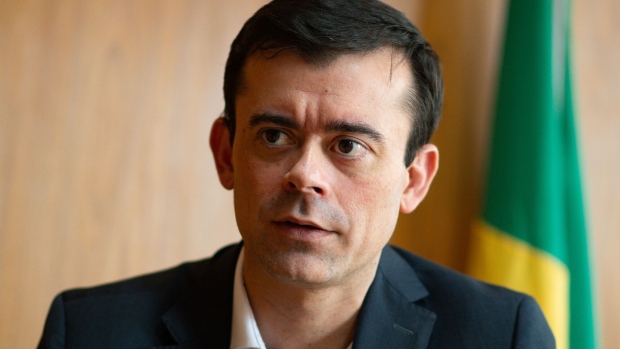Jul 28, 2023
Brazil Readies ESG Bond Debut in Next Overseas Sale This Year
, Bloomberg News

(Bloomberg) -- Brazil will offer its first bonds linked to social and environment projects in the coming months, a long-awaited jump into sustainable debt markets that will demonstrate its commitment to ambitious climate goals, Treasury Secretary Rogerio Ceron said.
Latin America’s largest economy has never before issued sustainable bonds, but plans to do so the next time it seeks funding in the international market. A new operation should be ready by the end of August, with sales likely taking place in dollars between September and November, Ceron told Bloomberg News in an interview from his office in Brasilia.
The much-anticipated debut will mark a step forward for President Luiz Inacio Lula da Silva’s efforts to deliver on major environmental and social pledges, according to the secretary.
“It is a geopolitical sign of the concreteness with which Brazil is committing itself to the environmental and social agenda,” Ceron said.
Global ESG debt swelled to more than $5 trillion in the first quarter of this year, and is expected to continue expanding. Governments around the world issued about $70 billion in green and sustainable bonds over the first half of 2023, according to data compiled by Bloomberg in June.
But Brazil has lagged other emerging market nations in joining the rush. After initially planning to pave the way for sales in 2021, it formed a committee this year with the goal of finally following through.
Read More: The World’s $5 Trillion Pile of ESG Debt Is Set to Keep Rising
The government is also expecting a boost in foreign investors’ appetite for domestic bonds, especially after Fitch Ratings upgraded Brazil’s credit score earlier this week. The agency raised the South American nation’s debt rating to BB from BB-, putting it two notches below investment grade. The outlook is stable.
“Fitch’s decision brings a lower risk to foreigners and increases interest in the Brazilian market,” Ceron said.
The Treasury has observed an increase in foreign investor demand for local bonds, according to Ceron. That has caused an increase in its offering of long-term, fixed-rate securities, and the Treasury will follow with larger issuances if demand continues to rise.
“We expect foreign interest to increase in the second half of the year,” he said.
Ceron sees 2024 as a challenging year for fiscal policy, with Finance Minister Fernando Haddad pledging to zero a federal budget deficit that is projected to end 2023 at 145 billion reais ($30.7 billion).
The Finance Ministry plans to introduce several measures to boost revenue in an effort to close the gap. Some of the plans will require congressional approval, and a few are already facing pushback from the financial industry, including a proposal to tax closed-end funds.
The government could seek alternative measures to increase revenue if congress fails to approve some of Haddad’s proposals, Ceron said. Lula’s economic team could also freeze funds up to 50 billion reais to comply with public spending rules, if necessary, he added.
While next year will be difficult, it will also be a turning point for the government, according to the secretary. He said he believes the economic team will deliver a balanced budget, a development that would help ease investor worries about Brazil’s fiscal outlook.
“If the year goes well, as expected, the fiscal agenda loses its importance,” he said.
©2023 Bloomberg L.P.






